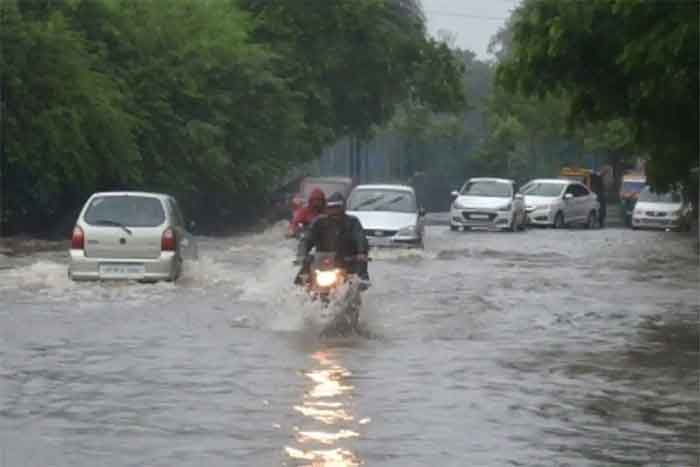The princely state of Cooch Behar merged with the Dominion of India on August 8, 1949 and became a part of the State of West Bengal on January 1, 1950. To go to Cooch Behar, one has to cross Darjeeling and Jalpaiguri districts, which were also once part of other neighbouring hill kingdoms and annexed by the British.
During my visit, Muharram festivities were in full swing near the mazar of Torsa Baba Pir built by the early nineteenth century poet King Harendranarayan near Harin Chowra within the city, the Royal Palace was getting its last touches of decoration for Independence Day celebrations and evening puja had started at the famous Madan Mohan Temple as also the Kali Temple within the same premises.
“By the blessings of Lord Madan Mohan, we are finally out of the clutches of Covid. Particularly after the Kamrup-Kamakhya pilgrimage started in full swing, these pilgrims also visit Lord Madan Mohan while returning… so business is not dull anymore” says a shopkeeper here.
“There had been problems in the Covid years, particularly for some months. But now it is perfectly OK”, says the seller whose shop was doing brisk business even after dusk fall; people were coming and buying sweets from his shop and entering the temple complex.
But another seller differed. His was a little shop, like most of the other shops in the area, which depend on visitors of the temples.
 “Covid impact is yet not over, our monthly turnover is still 10-20% down compared to pre-Covid days; if you add inflation, that makes things worse. In our family we stopped our cable-TV connection, tightened our purse strings while buying food items, curtailed tuitions for children, what more is there to say”.
“Covid impact is yet not over, our monthly turnover is still 10-20% down compared to pre-Covid days; if you add inflation, that makes things worse. In our family we stopped our cable-TV connection, tightened our purse strings while buying food items, curtailed tuitions for children, what more is there to say”.
The temporary staff working in the religious estates are hopeful about news that their monthly salary will increase.
“You can guess what a salary of Rs.8500 means these days, but still we are thankful we get wages, most informal workers do not get anything”, said Mohanta, one of the temporary workers. “But you cannot notice the poverty if you roam around the city. Many people are becoming richer, God knows how, the town is getting more glitzy, more cars, motor-bikes”.
Next day at about noon Naran Das was furious as his handcart was obstructed for a while by an e-rickshaw, in front of the Royal Palace. Naran was hurrying to work, he had got one 3-day-job after so many weeks.
“It is noon and still I could not afford a bite; I loaned some packs of flour and gave it to my wife and told her to shut up till I get my payment”, he said, breathing heavily. “Since the Covid lockdown started more than two years ago, we did not taste fish for a single day. My daughter, now formally in class 4, forgot everything and stopped going to school. Why should she? Do you know what ‘meal’ they give these days in school? Had the government not given us free rations we would have perished long ago.”
He is frustrated with everything, “Look at the garden in the palace, the lawn; we used to work there, once we even got more than ₹8000 a month and then Covid stopped everything. They are not hiring any contract labourers.”
Gobinda Ghosh, a grocer, at a place about a kilometre away was serving a ‘customer’: Lentils for ₹10, Mustard oil ₹20, …thus goes the list.
“Their family do not come regularly now, they feel ashamed, they owe me ₹24,000 and could not pay. Our shop is luckily not dependent on many such poor customers, rather they are middle class, you may say. But business is not normal. Purchasing power has fallen. I could not have managed my family without my son finding some way of earning, via private tuitions. But other things are happening too. Perhaps if you come after a couple of years, you will not see this store anymore. One big mart has come into our city and slowly some grocers are becoming just like franchises or branches of that company, others are withering away. I have heard that company agents will come in this neighbourhood soon.”
In the farthest flung sub-division, Mekhliganj, the picture is not much different. Haldibari is one of the oldest townships there. Nirmal Nunia, a Group D temporary worker, gets ₹4000 a month, does some home tuitions almost all evenings to earn ₹2000 more. His wife’s paltry income from sewing stopped during Covid and now it is only ₹1000 a month at a maximum and her mother, who was a maid working in several houses is not getting work even after Covid has declined.
Ajay Ray runs an e-rickshaw but his average earning is still ₹200 a day. He enquired whether going over to agriculture in nearby villages, taking an acre or half land on lease would be better; he had heard that rice was going to get costlier. But Subhas Burman who runs a pan shop is pessimistic; he ran into losses last year in both tobacco and jute and he has no hopes from rice cultivation. “Anyway, what can you do with less than an acre of land!”
Nigun Burman cannot make both ends meet running his e-rickshaw; the cost of medicine for his wife is getting beyond his means. But he looked ashamed when I saw two lottery tickets in his hand, “Just trying my luck, ₹10 only.”
A retired school teacher is taken aback by the behaviour of those who were once his students. “This addiction has set in so quickly. My conservative estimate is that in our subdivision poor working people buy tickets worth at least ₹30 crores a year!” What an extravagance – considering even an old retired government employee cannot run his family properly for 20 days with his or her pension nowadays.
It is evident that almost all poor workers are worse off than what they were in pre-Covid days, as more and more people told me their stories. Hafez aunty of Mekhliganj does not know how to pay electricity bills which are now, she heard, running into thousands of rupees. She stopped doing agriculture as the family suffered losses in tobacco and rice cultivation. She arranged some money and opened a streetside shop. But she cannot understand how much will be sold, “Day before yesterday I sold two pots of Momo but yesterday not even one was not sold.” Her family has not been able to buy fish or meat for months.
“The government gives an old age pension to my husband, I get money from the Lakshmi Bhandar scheme, but everything goes for medicines. I cannot regularly buy LPG fuel for cooking. Our kind neighbours allow us to collect dried branches to use as firewood. I go to the market very late, when only such vegetables are left which people did not buy. Cheaper leftovers for us! Even potatoes are costly. My son is not getting regular work as a helper for masons. But we are still trying to see that our grandchildren continue schooling. Though instead of two we can afford only one private tuition.”
Hafez aunty lamented how she once used to cultivate tobacco and jute, all with family labour, and how later agriculture got ruined for poor peasants due to fertilisers, irrigation, tractors, everything getting costlier. On top of all this plant diseases were unpredictable and sale-prices were low. For two years the family did not buy new clothes, but luckily one Hindu friend gave her a new saree last year.
Alipurduar was till recently a part of this district, now it is another district. It is at the foothills of the Himalayas. There are many tea gardens nearby.
“Two and half years ago I could earn ₹1200-1300 after paying fuel bills. But nowadays it is hardly ₹400-500”, said Bikas Ray, a small transporter here. Biman Burman works as a helper to masons and his earning was 300-400 a day before the Covid lockdown and is the same even now. “But prices of everything have risen much in the last few years”, he says.
Mukul says he could not have survived had there been no free-rice-wheat as part of the government ration and he also thanks his forefathers for his land in the village, about 1.5 acre. He cultivates rice and jute mainly with family labour.
Inside the little town the small shopkeepers all agreed that their earnings have decreased by at least 20-25%. “The Covid lockdown made all the difference”.
Sandeep Banerjee is a researcher based in Kolkata, West Bengal















































